Can cats eat eggs? Yes, but are they safe for them?
It’s Sunday morning, and you have been long waiting to try out that tutorial from Jacques Pépin on how to make a super runny, shiny yellow, buttery French omelet.
So you storm into the kitchen, turn on the gas stove, take the pan out, throw a little chunk of butter, crack those eggs, all while enjoying your melodic French accordion playlist.
Out comes your cat from a good night’s rest to take a morning stroll on the kitchen island, giving you a look of a micromanager who always seems to be starving to death. And you have nothing to feed but eggs. So, you ask yourself — can cats eat eggs?
And, the answer, is indeed a resounding yes!
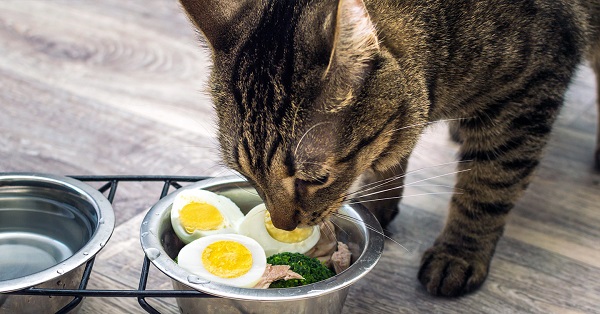
Can Cats Have Eggs?
The short answer is yes, cats can safely eat eggs. However, Properly cooked eggs are the only form of eggs cats can eat. Eggs are just as nutritious for cats as they are for us humans. They are a perfect source of animal protein and are considered a superfood.
Likewise, eggs are good for cats and can be safely consumed in moderation when cooked.
And if you are wondering that your cat would like to eat that buttery French omelet, then you can rest assure because she will thank you for this egg-ceptional treat.
Some people have mixed feelings when feeding eggs to their pet cats. While some even detest the very thought of it, thinking that the eggs might do more harm than good.
However, there are two words to keep in mind — moderation & balance. Feeding your cats eggs is healthy and safe, assuming that you are giving them in moderation and your cat’s diet is well-balanced.
We will discuss that further in the article below.
When Are Eggs Bad for Cats?
First things first, when it comes to eggs in your cat’s diet, say NO to raw eggs. Properly cooked eggs are the only form of eggs you should feed your cat. It is not a choice or a preference; there’s science behind this.
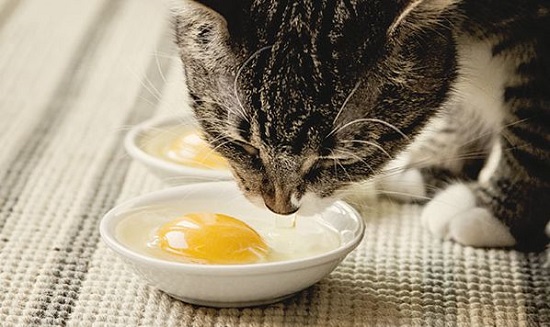
Giving your cat raw chicken eggs can cause zoonotic bacterial infections. Don’t play down this notion; the disease can also spread to humans from cats.
Cats should not eat raw eggs. Neither should they eat any other raw diets/foods. If cats eat uncooked eggs, this can increase the likelihood of being contaminated with a bacteria known as Salmonella.
As reported by the FDA, Salmonella is toxic to both felines and humans, too. Even kissing your furry pal can also cause you to accidentally ingest Salmonella. Further, the uncooked eggs white also has a protein called avidin, which can disrupt the intake of complex B vitamins and biotin.
So if you don’t have time to scramble the eggs and cook them, can cats eats raw eggs? No! Period!
Nevertheless, cooking an egg can significantly reduce the chances of bacteria present in it, making it safe for your cat to eat. While the answer to the question “are raw eggs good for cats?” is a big no.
How Much Egg Is Too Much for Your Cat?
If you are trying to boost up the overall nutritional value of your cat’s diet, then eggs can indeed be a great addition. Apart from protein and amino acids, eggs contain high amounts of fat and cholesterol. Now, this is the reason why you should give your cat eggs in small proportions.
Overeating eggs can cause obesity in your cat, and related health problems may also follow along. So, you should only offer eggs to your kitty as occasional treats to mellow her out. On the other hand, eggs are known to be the source of some of the most common food allergies.
So, you should introduce eggs slowly into your cat’s diet. However, if your sweet feline shows any signs of health issues, such as vomiting or diarrhea, stop feeding eggs and seek veterinary help.
And if your cat can eat eggs without a problem, then know that you shouldn’t feed more than once daily. As a rule of thumb, eggs should only make up one-tenth of your cat’s daily diet. Generally, an egg contains about 80 calories, so the amount you give them should be small since the calorie requirements of cats are low.
| Bodyweight (lbs) | Calorie Requirements ( Kcal Per day) |
| 1 | 39 |
| 2 | 65 |
| 3 | 88 |
| 4 | 110 |
| 5 | 130 |
| 6 | 149 |
| 7 | 167 |
| 8 | 184 |
| 9 | 200 |
| 10 | 218 |
At last, always remember, when it comes to eggs, fewer is better if your kitty is prone to conditions such as pancreatitis, or is overweight, or has kidney disease.
Can Cats Be Allergic To Eggs?
For the most part, eggs are safe for cats. However, in certain circumstances, this might be correct for some cats even if they eat a cooked egg. Some felines can have adverse effects when they eat eggs, and this is usually related to an allergy to eggs.
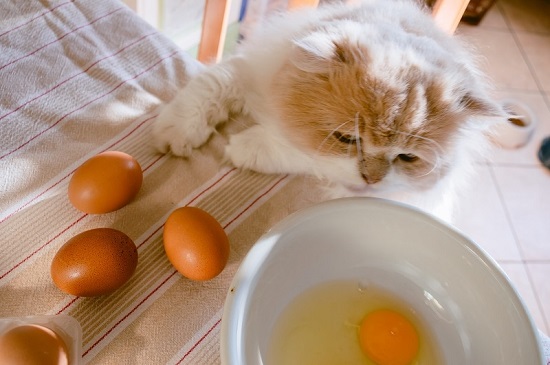
After feeding eggs to your cat, if you think she is showing any of these reactions, then it is likely that your kitty has an allergy to eggs.
- Too much sneezing
- Inflammation and infection in your cat’s ears
- Puffy paws
- Excessive grooming
- Digestive issues
- Vomiting
- Diarrhea
- Swollen face
While eggs are not the food that some cats may have an allergic reaction to, they can exhibit adverse effects on other foods as well. For instance, onions, grapes, and chocolates; some cats should not eat these under any circumstances.
Can Kitten Eat Eggs?
Yes, kittens can have eggs, too. Eggs can be a nutritious addition to a kitten’s diet, making sure she gets all the right nutrition she needs as she reaches adulthood.
Similar to senior cats, kittens should also be given cooked eggs without salt, pepper, or any other seasoning.
What Else Can Cats Eat?
If I have not mentioned it enough, then yes, cats can have eggs, but under reasonable limits. And with all the chock-full of nutritious benefits, we would love to share eggs with our feline friends. However, you should only feed eggs to your kitty conditionally.
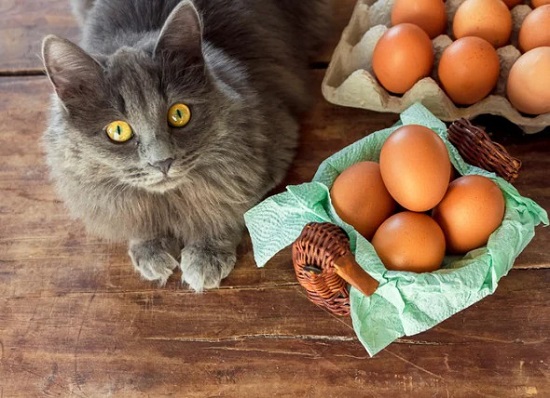
Raw Eggs
Unfortunately, you cannot feed raw eggs to your furbaby. There are some grounds for raw eggs being hurtful to your cat’s health. Firstly, the inside of an egg can contain salmonella and E-Coli bacteria, which can make your cat sick with digestive problems if you feed her raw eggs.
And secondly, eggs also contain a protein called avidin. This glycoprotein can interrupt the absorption of vitamin B7 in cats, which can lead to vitamin deficiency and medical issues in the future.
So, in general, raw eggs are a big no for cats.
Egg Yolks
Egg yolks as food for cat? Yes, only if the egg yolk has been properly cooked. However, there is also a downside to egg yolks for cats, even if they are cooked.
Egg yolk is the part of an egg where the highest quantity of fat and cholesterol is stored. Even supposing an egg yolk has been properly cooked, it can still cause trouble, if your cat is overweight or has kidney problems.
But offering cooked egg yolks as an occasional treat to your cat can do no harm. Consult with your veterinarian, as they can help you better for your specific case.
Egg Whites
Yes, egg whites are good, as long as they are cooked. They contain lots of protein without any fat, so egg whites can be very nutritious for cats, but in moderation, of course.
So, when you make scrambled eggs on a Sunday morning, feed a spoonful of egg whites to your cat. The nutrition contained within the egg whites is enough to supplement their protein needs.
Eggshells
Eggshells can do wonders if your cat is low on calcium. They are packed full of essential elements such as:
- Molybdenum
- Iron
- Boron
- Copper
- Silicon
- Sulfur
- Manganese
- Magnesium
- Zinc
It is better to feed eggshells that have been peeled from a boiled egg, this reduces the chances of bacteria present in them. Grind and sprinkle the eggshell powder over your cat’s food for a good calcium boost.
What Is the Best Way to Cook Eggs for Cats?
Cats can eat eggs that are cooked. The best way you can cook/feed eggs is by poaching, scrambling, frying, or boiling them. However, you should not add any seasoning when you cook the eggs for your cat.
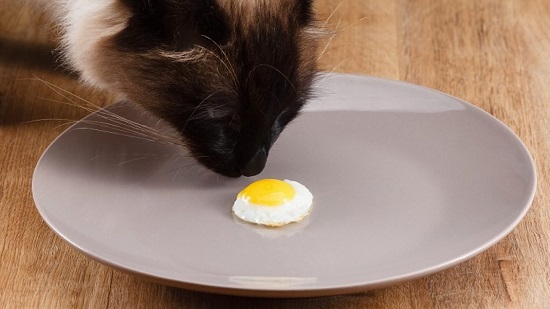
Egg yolks contain more fat content than egg whites. Feeding only the egg yolks can increase the risk of health problems such as obesity. Whereas feeding only egg whites can have no problem. They do not contain fat, but instead, they make a good source of protein in your cat’s diet.
If you are feeding a hard-boiled to your cat, make sure it is properly peeled without any shell remnants. Eggshells are not harmful or toxic to cats, though they should be crushed into small pieces, making it easier for your cat to eat. They are a rich source of nutrients like calcium and other minerals, which are good for a cat’s bones and ligaments.
Likewise, cats are fussy eaters. When you offer them scrambled eggs, they may avoid it at first. But you can hide the small pieces in their everyday cat food to get them accustomed to the taste.
The Bottom Line
So, at last, the answer to the question “can cats eat eggs?“ is obviously yes, but always keep the two words – moderation and balance in mind.
When given under moderation and in a balanced proportion, eggs can do no wrong to our feline friends.
Eggs are good, and they also offer a chock-full of health benefits for your cat. But they are like treats, so make sure they do not make up a sizable chunk of your feline’s diet.
Offer them as a healthy treat in small amounts, and your tiny tiger’s health will thank you for it.
Approved by Veterinary – Anthony Brooks, DVM!
References:
- Toxoplasmosis in Cats. (2019, November 21). Cornell University College of Veterinary Medicine. https://www.vet.cornell.edu/departments-centers-and-institutes/cornell-feline-health-center/health-information/feline-health-topics/toxoplasmosis-cats
- Claudia J. Carey, James G. Morris, Biotin Deficiency in the Cat and the Effect on Hepatic Propionyl CoA Carboxylase, The Journal of Nutrition, Volume 107, Issue 2, February 1977, https://doi.org/10.1093/jn/107.2.330
- Functional foods in pet nutrition: Focus on dogs and cats. (n.d.). Retrieved November 25, 2022, from https://www.sciencedirect.com/science/article/pii/S0034528816303332?via=ihub

